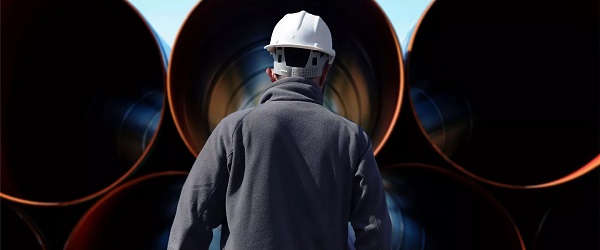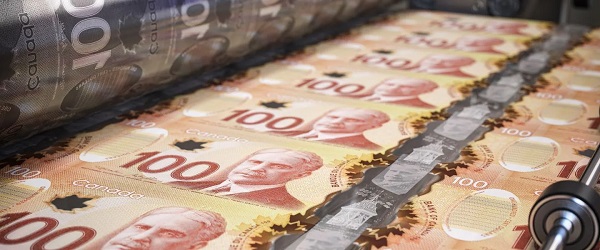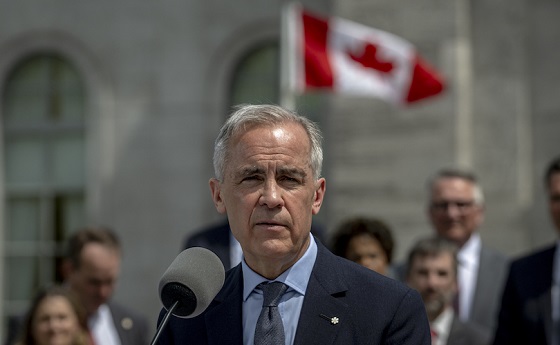Energy
Ottawa’s mixed signals create more uncertainty in energy sector

From the Fraser Institute
By Julio Mejía and Elmira Aliakbari
The Carney government continues to send mixed signals to Canada’s energy sector. Earlier this month, less than 48 hours after Prime Minister Carney expressed conditional support for new pipelines, Steven Guilbeault, a high-profile member of Carney’s cabinet, dismissed the need for additional pipeline infrastructure, claiming that the Trans Mountain pipeline is operating at “about 40 per cent capacity” while also citing a lack of private-sector interest in building east-west pipelines due to an upcoming peak in oil demand.
But claims about the Trans Mountain pipeline from Guilbeault—former Minister of Environment and Climate Change, now Minister of Canadian Identity and Culture—are inaccurate. They also overlook a key point—despite regulatory hurdles, the energy industry maintains a strong interest in building pipelines to meet the growing global demand.
Canadians may recall the Trans Mountain Pipeline project—running between Strathcona County, Alberta and Burnaby, British Columbia—was marked by delays and overruns. After the Trudeau government purchased it from Kinder Morgan for $4.5 billion in 2018, costs ballooned to $34 billion. Since its opening in May 2024—five years behind schedule—the pipeline has reached 89 per cent capacity utilization (more than twice what Minister Guilbeault claimed), with projections showing it could approach 96 per cent in the near future. In short, more pipeline capacity will be needed soon.
Minister Guilbeault’s statements about peak oil demand are also off the mark. For starters, the Energy Information Administration forecasts that global oil consumption will keep growing through 2050—not just until 2028-2029 as Guilbeault claimed. Firms such as Goldman Sachs and GlobalData suggest that oil demand is set to rise well beyond 2030. Meanwhile, the Organization of the Petroleum Exporting Countries (OPEC) goes even further, forecasting that global oil demand will continue growing past 2050 while stating there’s “no peak oil demand on the horizon.” Simply put, it’s shortsighted for the government to undermine infrastructure projects when multiple credible forecasts point to increased demand.
Moreover, pipelines transport more than just crude oil—they also deliver natural gas to domestic markets and coastal ports for export. Even the International Energy Agency (IEA), which Guilbeault cites as his source, projects that global demand for liquified natural gas (LNG) will continue to grow steadily through 2050. This strong LNG demand presents a significant opportunity for Canada to become a major LNG exporter and provide cleaner burning fuels. But to seize this opportunity, we need infrastructure to get our energy to tidewater.
Furthermore, Guilbeault’s claim that there’s no interest in building east-west pipelines also contradicts industry sentiment. A recent survey by KPMG, a leading audit and consulting firm, found that more than 80 per cent of Canadian energy and natural resource CEOs support additional pipelines and infrastructure on both the west and east coasts to access international markets.
Currently, most of our oil and natural gas exports go to the United States. This dependence on the U.S. for energy exports has made Canadian energy producers vulnerable to U.S policy changes (as seen with the recent threat of U.S. tariffs on Canadian energy). Building more pipelines would reduce our reliance on a single buyer and open access to Canadian refineries and ports, enabling us to export oil and gas to other markets, including both Europe and Asia.
In fact, it’s not just the industry that calls for more energy infrastructure. Recent polls indicate that most Canadians support building additional oil and gas pipelines to all coasts, and LNG facilities, to diversify energy exports beyond the U.S. Yet, federal polices continue to stand in the way of critical energy infrastructure. For instance, Bill C-69, also known as the Impact Assessment Act, has created massive uncertainty by introducing subjective criteria including “gender” implications into the evaluation of major energy projects. Similarly, the federal government’s greenhouse gas emissions cap, which exclusively targets the oil and gas sector, deters investment by effectively requiring a reduction in production and, in turn, reducing the need for new infrastructure.
Minister Guilbeault’s inaccurate statements and the Carney government’s continued mixed signals deepen the uncertainty for investors. Rather than creating confusion with conflicting statements, the federal government should provide clarity through a competitive regulatory framework—one that allows investors, guided by market realities, to determine when and where pipelines are truly needed.
Business
Carney budget doubles down on Trudeau-era policies

From the Fraser Institute
By Kenneth P. Green and Elmira Aliakbari
The Carney government tabled its first budget, which includes major new spending initiatives to promote a so-called “green economy,” and maintains greenhouse gas (GHG)-emission extinction as a central operating principle of Canadian governance.
The budget leaves untouched most of the legislative dampers on Canada’s fossil fuel sector (oil, gas, coal) of the last 10 years, while pouring still more money into theoretically “green” projects such as additional (and speculative new types) of nuclear power, electrical transmission to service “green” energy production, continued tax credits for alternative fuels such as hydrogen, and more. Adding insult to injury, the budget discusses “enhancing” (read: likely increasing) the carbon tax on industrial emitters across Canada, and tightening controls over provinces to ensure they meet new federal tax targets.
Over the past decade, Ottawa introduced numerous regulations to restrict oil and gas development and again accelerate the growth of the green sector. Key initiatives include Ottawa’s arbitrary cap on GHG emissions for the oil and gas sector, which will restrict production; stricter regulations for methane emissions in the oil and gas industry, which will also likely restrict production; “clean electricity” regulations that aim to decarbonize Canada’s electricity generation; Bill C-69 (which introduced subjective ill-defined criteria into the evaluation of energy projects); and Bill C-48, known as the oil tanker ban on the west coast, which limits Canadian exports to Asian and other non-U.S. markets.
At the same time, governments launched a wide range of spending initiatives, tax credits and regulations to promote the green economy, which basically includes industries and technologies that aim to reduce pollution and use cleaner energy sources. Between 2014/15 and 2024/25, federal spending on green initiatives (such as subsidizing renewable power, providing incentives for electric vehicles and charging infrastructure, funding for building retrofits, and support for alternative fuels such as hydrogen, etc.) went from $0.6 billion to $23 billion—a 38-fold increase. Altogether, since 2014, Ottawa and provincial governments in the country’s four largest provinces (Ontario, British Columbia, Quebec and Alberta) have spent and foregone revenues of at least $158 billion to promote the green sector.
Yet, despite the government’s massive spending and heavy regulation to constrain the fossil fuel industry and promote the green sector, the outcomes have been extremely disappointing. In 2014, the green sector accounted for 3.1 per cent of Canada’s economic output, and by 2023, that share had only slightly grown to 3.6 per cent. Put simply, despite massive spending, the sector’s contribution to Canada’s economy has barely changed. In addition, between 2014 and 2023, despite billions in government spending to promote the green sector, only 68,000 new jobs were added in this sector, many of them in already established fields such as waste management and hydroelectric power. The sector’s contribution to national employment remains small, representing only 2 per cent of total jobs in the country.
Not surprisingly, this combination of massive government spending and heavy-handed regulation have contributed to Canada’s economic stagnation in recent years. As documented by our colleagues, Canadian living standards—measured by per-person GDP—were lower in the second quarter of 2025 than six years earlier, suggesting we are poorer today than we were six years ago.
But for Prime Minister Carney, apparently, past failures do not temper future plans, as the budget either reaffirms or expands upon the failed plans of the past decade. No lessons appear to have even been considered, much less learned from past failures.
There had been some hope that Carney’s first budget would include some reflection of how badly the natural resource and energy policies of the Trudeau government have hurt Canada’s economy.
But other than some language obfuscation—“investment” vs. “spending,” “competitiveness” of GHG controls (not economy), and the “green” energy economy vs. the “conventional” energy economy—this is a Trudeau-continuance business-as-usual agenda on steroids. Yes, they will allow some slight deceptive rollbacks to proceed (such as rolling the consumer carbon tax into the industrial carbon tax rather than eliminating it), and may allow still more carbon taxes to render at least one onerous Trudeau-era regulation (the oil and gas cap) to be rendered moot, but that’s stunningly weak tea on policy reform.
The first Carney budget could and likely will, if passed, continue the economic stagnation plaguing Canada. That does not bode well for the future prosperity of Canadians.
Daily Caller
UN Chief Rages Against Dying Of Climate Alarm Light


From the Daily Caller News Foundation
The light of the global climate alarm movement has faded throughout 2025, as even narrative-pushing luminaries like Bill Gates have begun admitting. But that doesn’t mean the bitter clingers to the net-zero by 2050 dogma will go away quietly. No one serves more ably as the poster child of this resistance to reality than U.N. chief Antonio Guterres, who is preparing to host the UN’s annual climate conference, COP30, in Brazil on Nov. 10.
In a speech on Monday, Guterres echoed poet Dylan Thomas’s advice to aging men and women in his famed poem, “Do not go gentle into that good night:”
Do not go gentle into that good night,
Old age should burn and rave at close of day;
Rage, rage against the dying of the light.
Dear Readers:
As a nonprofit, we are dependent on the generosity of our readers.
Please consider making a small donation of any amount here.
Thank you!
Though wise men at their end know dark is right,
Because their words had forked no lightning they
Do not go gentle into that good night.
Seeing that his own words have “forked no lightning,” Guterres raged, raged against the dying of the climate alarm light.
“Governments must arrive at the upcoming COP30 meeting in Brazil with concrete plans to slash their own emissions over the next decade while also delivering climate justice to those on the front lines of a crisis they did little to cause,” Guterres demanded, adding, “Just look at Jamaica.”
Yes, because, as everyone must assuredly know, the Earth has never produced major hurricanes in the past, so it must be the all-powerful climate change bogeyman that produced this major storm at the end of an unusually slow Atlantic hurricane season.
Actually, Guterres’ order to all national governments to arrive in Belem, Brazil outfitted with aspirational plans to meet the net-zero illusion, which everyone knows can and will never be met, helps explain why President Donald Trump will not be sending an official U.S. delegation. Trump has repeatedly made clear – most recently during his September speech before the U.N. General Assembly – that he views the entire climate change agenda as a huge scam. Why waste taxpayer money in pursuit of a fantasy when he’s had so much success pursuing a more productive agenda via direct negotiations with national leaders around the world?
“The Green New Scam would have killed America if President Trump had not been elected to implement his commonsense energy agenda…focused on utilizing the liquid gold under our feet to strengthen our grid stability and drive down costs for American families and businesses,” Taylor Rogers, a White House spokeswoman, said in a statement to the Guardian. “President Trump will not jeopardize our country’s economic and national security to pursue vague climate goals that are killing other countries,” she added.
The Guardian claims that Rogers’s use of the word “scam” refers to the Green New Deal policies pursued by Joe Biden. But that’s only part of it: The President views the entire net-zero project as a global scam designed to support a variety of wealth redistribution schemes and give momentum to the increasingly authoritarian forms of government we currently see cracking down in formerly free democracies like the U.K., Canada, Germany, France, Australia and other western developed nations.
Trump’s focused efforts on reversing vast swaths of Biden’s destructive agenda is undoing 16 years of command-and-control regulatory schemes implemented by the federal government. The resulting elimination of Inflation Reduction Act subsidies is already slowing the growth of the electric vehicles industry and impacting the rise of wind and solar generation as well.
But the impacts are international, too, as developing nations across the world shift direction to be able to do business with the world’s most powerful economy and developed nations in Europe and elsewhere grudgingly strive to remain competitive. Gates provided a clear wake-up call highlighting this global trend with his sudden departure from climate alarmist orthodoxy and its dogmatic narratives with his shift in rhetoric and planned investments laid out in last week’s long blog post.
Guterres, as the titular leader of the climate movement’s center of globalist messaging, sees his perch under assault and responded with a rhetorical effort to reassert his authority. We can expect the secretary general to keep raging as his influence wanes and he is replaced by someone whose own words might fork some lightning.
David Blackmon is an energy writer and consultant based in Texas. He spent 40 years in the oil and gas business, where he specialized in public policy and communications.
-

 Justice1 day ago
Justice1 day agoCarney government lets Supreme Court decision stand despite outrage over child porn ruling
-

 COVID-191 day ago
COVID-191 day agoFreedom Convoy leader Tamara Lich to appeal her recent conviction
-

 Daily Caller2 days ago
Daily Caller2 days agoUS Eating Canada’s Lunch While Liberals Stall – Trump Admin Announces Record-Shattering Energy Report
-

 Business1 day ago
Business1 day agoCarney’s budget spares tax status of Canadian churches, pro-life groups after backlash
-

 Daily Caller1 day ago
Daily Caller1 day agoUN Chief Rages Against Dying Of Climate Alarm Light
-

 Business2 days ago
Business2 days agoPulling back the curtain on the Carney government’s first budget
-

 Energy2 days ago
Energy2 days agoEby should put up, shut up, or pay up
-

 Business2 days ago
Business2 days agoThe Liberal budget is a massive FAILURE: Former Liberal Cabinet Member Dan McTeague











